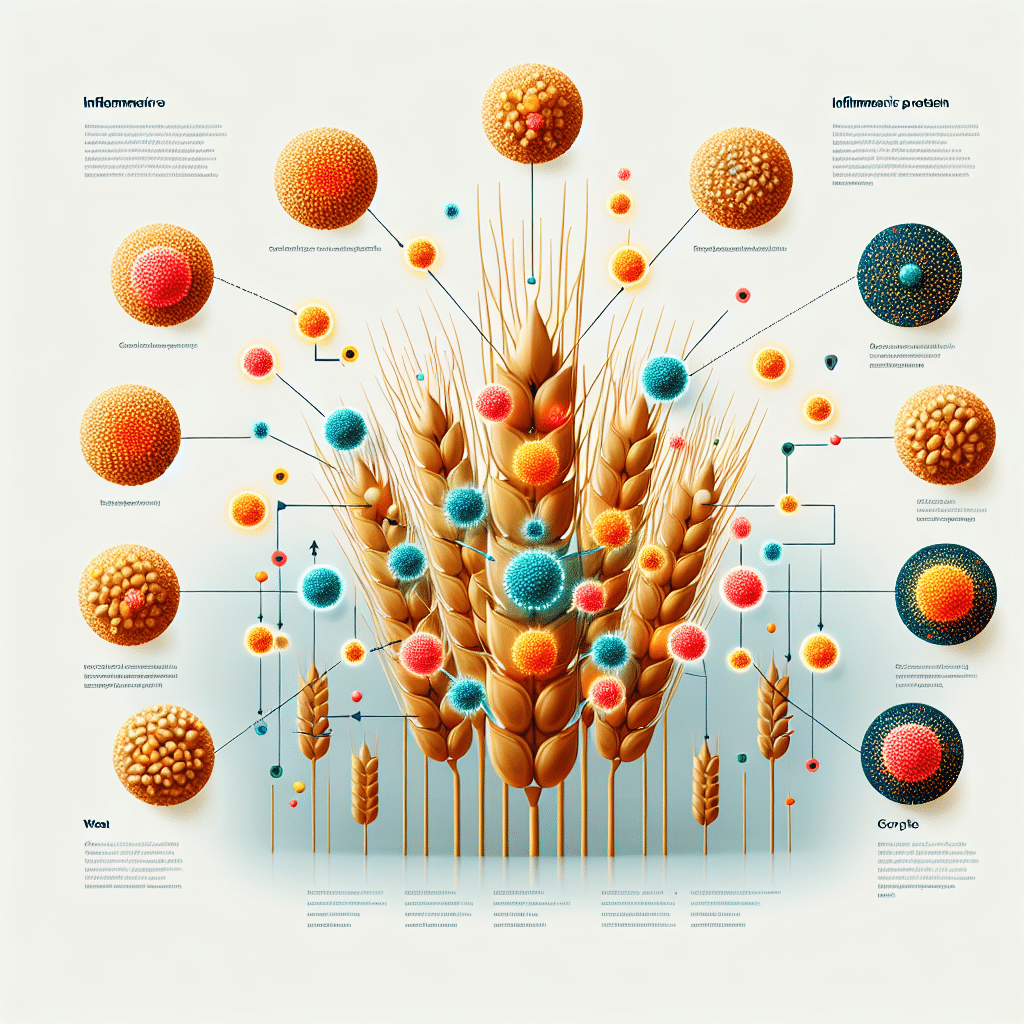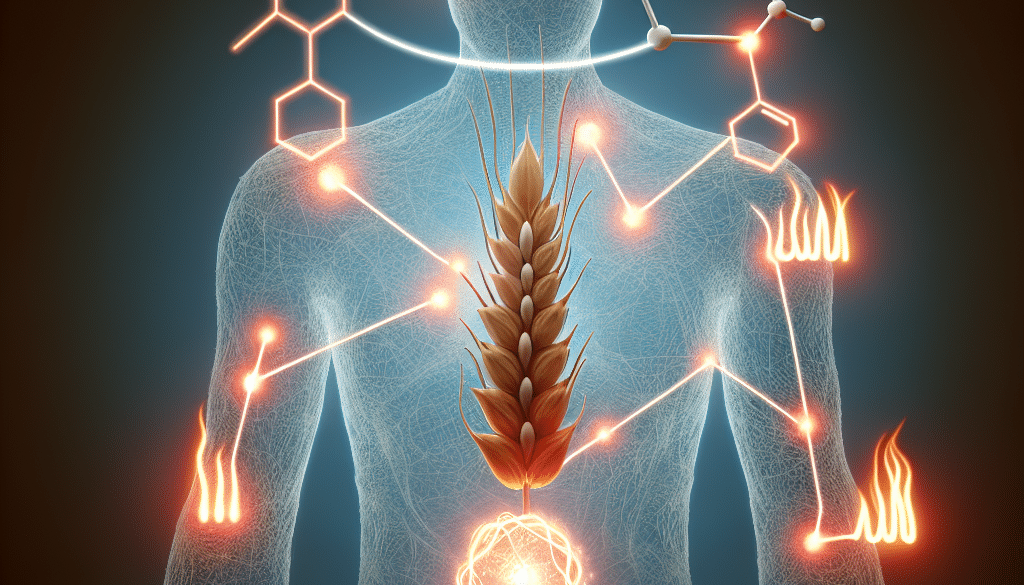What Is The Inflammatory Protein In Wheat? The answer
Table of Contents
- Inflammatory Proteins in Wheat: Understanding Their Impact on Health
- Understanding Wheat Proteins and Inflammation
- Gliadin and Its Role in Inflammation
- Non-Celiac Gluten Sensitivity (NCGS)
- Wheat Germ Agglutinin (WGA)
- Scientific Research on Wheat and Inflammation
- Case Studies and Statistics
- Alternatives to Wheat for Those with Sensitivities
- Conclusion: The Significance of Inflammatory Proteins in Wheat
- Discover ETprotein’s Range of Non-Wheat Protein Products
Inflammatory Proteins in Wheat: Understanding Their Impact on Health

Wheat is a staple food for many cultures around the world, known for its versatility and nutritional value. However, for some individuals, wheat can trigger inflammatory responses that lead to discomfort and health issues. This article delves into the inflammatory proteins found in wheat, their effects on the body, and the scientific research surrounding them.
Understanding Wheat Proteins and Inflammation
Wheat contains a variety of proteins, some of which can cause inflammation in certain individuals. The primary protein associated with inflammation in wheat is gluten. Gluten is a composite of two main proteins: gliadin and glutenin. It is gliadin that is often implicated in inflammatory responses.
Gliadin and Its Role in Inflammation
Gliadin is a prolamin protein found in wheat and other grains like barley and rye. When consumed, gliadin can cause an immune response in people with celiac disease, a genetic autoimmune disorder. In celiac disease, the immune system mistakenly attacks the small intestine upon gliadin exposure, leading to inflammation and damage to the intestinal lining.
Non-Celiac Gluten Sensitivity (NCGS)
Some individuals experience symptoms similar to those of celiac disease without the autoimmune response. This condition is known as non-celiac gluten sensitivity (NCGS). While the exact mechanism is not fully understood, it is believed that gliadin and other wheat proteins may trigger an innate immune response, leading to systemic inflammation in these individuals.
Wheat Germ Agglutinin (WGA)
Another protein of interest is wheat germ agglutinin (WGA), a lectin found in wheat. Lectins are a type of protein that can bind to cell membranes. WGA has been shown to cause inflammation in the gut and may disrupt the integrity of the intestinal barrier, potentially leading to a condition known as “leaky gut.”
Scientific Research on Wheat and Inflammation
Research has provided insights into how wheat proteins can cause inflammation and the potential health consequences. Here are some key findings:
- Studies have shown that gliadin can increase the production of pro-inflammatory cytokines, which are signaling molecules that mediate and regulate immunity and inflammation.
- Research on NCGS has indicated that there may be a non-immune component to the sensitivity, suggesting that other proteins in wheat or the fermentable carbohydrates it contains could also play a role in symptoms.
- Investigations into WGA have demonstrated that this lectin can exacerbate inflammatory conditions and may contribute to the development of chronic diseases.
Case Studies and Statistics
Case studies of individuals with celiac disease or NCGS often reveal a significant improvement in symptoms and inflammatory markers after the removal of wheat and other gluten-containing grains from their diet. Statistics show that approximately 1% of the population has celiac disease, while estimates for NCGS prevalence vary widely, suggesting it may affect a larger portion of the population.
Alternatives to Wheat for Those with Sensitivities
For those who experience inflammation due to wheat proteins, there are several alternatives:
- Gluten-free grains such as rice, corn, quinoa, and buckwheat
- Starchy vegetables like potatoes and sweet potatoes
- Legumes, nuts, and seeds for protein and fiber
It’s important for individuals with sensitivities to consult with healthcare professionals to ensure they maintain a balanced diet when eliminating wheat.
Conclusion: The Significance of Inflammatory Proteins in Wheat
In conclusion, the inflammatory proteins in wheat, primarily gliadin and WGA, can have significant health implications for individuals with celiac disease, NCGS, or other sensitivities. Understanding these proteins and their effects on the body is crucial for managing symptoms and maintaining overall health. As research continues, we gain a clearer picture of how these proteins interact with our immune system and contribute to inflammation.
Discover ETprotein’s Range of Non-Wheat Protein Products
If you’re looking for wheat-free protein alternatives, ETprotein offers a diverse selection of organic bulk vegan proteins that are non-GMO and allergen-free. Their products include:
- Organic rice protein
- Clear rice protein
- Pea protein
- Clear pea protein
- Watermelon seed protein
- Pumpkin seed protein
- Sunflower seed protein
- Mung bean protein
- Peanut protein
- L-(+)-Ergothioneine EGT in various grades
ETprotein’s offerings cater to a wide range of industries, including nutraceuticals, pharmaceuticals, cosmeceuticals, and food and beverage. For those with dietary restrictions or preferences, ETprotein provides high-quality alternatives to wheat-based proteins.
About ETprotein:
ETprotein, a reputable protein and L-(+)-Ergothioneine (EGT) Chinese factory manufacturer and supplier, is renowned for producing, stocking, exporting, and delivering the highest quality organic bulk vegan proteins and L-(+)-Ergothioneine. They include Organic rice protein, clear rice protein, pea protein, clear pea protein, watermelon seed protein, pumpkin seed protein, sunflower seed protein, mung bean protein, peanut protein, and L-(+)-Ergothioneine EGT Pharmaceutical grade, L-(+)-Ergothioneine EGT food grade, L-(+)-Ergothioneine EGT cosmetic grade, L-(+)-Ergothioneine EGT reference grade and L-(+)-Ergothioneine EGT standard. Their offerings, characterized by a neutral taste, non-GMO, allergen-free attributes, with L-(+)-Ergothioneine purity over 98%, 99%, cater to a diverse range of industries. They serve nutraceutical, pharmaceutical, cosmeceutical, veterinary, as well as food and beverage finished product distributors, traders, and manufacturers across Europe, USA, Canada, Australia, Thailand, Japan, Korea, Brazil, and Chile, among others.
ETprotein specialization includes exporting and delivering tailor-made protein powder and finished nutritional supplements. Their extensive product range covers sectors like Food and Beverage, Sports Nutrition, Weight Management, Dietary Supplements, Health and Wellness Products, and Infant Formula, ensuring comprehensive solutions to meet all your protein needs.
As a trusted company by leading global food and beverage brands and Fortune 500 companies, ETprotein reinforces China’s reputation in the global arena. For more information or to sample their products, please contact them and email sales(at)ETprotein.com today.












